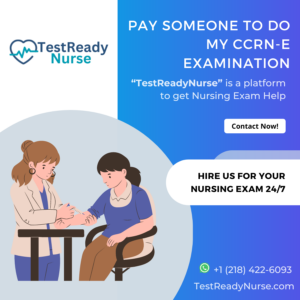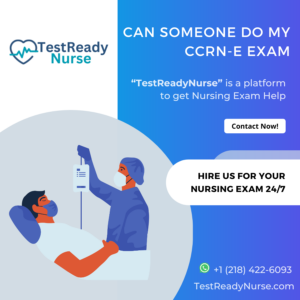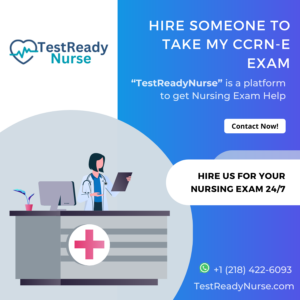Hire Someone To Take My CCRN-E Exam

Pay Someone To Do My CCRN E Examination
The Certified Critical Care Registered Nurse exam can be daunting and requires extensive critical care nursing experience to pass. To increase your odds of passing this CCRN E Examination, begin preparing early. Create a study plan and take practice tests regularly.
At the CCRN exam, you will be required to present government-issued identification with photo and signature for verification, as well as sign an honor statement.
Case Study Analysis
Case Studies are narrative accounts that examine an actual person, place, object or event. While case studies don’t adhere strictly to time constraints, their scope must still have an endpoint and an identifiable beginning. They can also include fictional elements that adapt from existing situations.
Read your case thoroughly to gain a complete understanding of its context and issues, identify any key contributors that impacted its outcome, and apply this knowledge back into nursing practice and education. Finally, it’s essential that a comprehensive list of sources be included with an appropriate citation style consistently applied throughout.
Once you have an in-depth knowledge of a case, you can analyze it from different perspectives. For instance, business management or ethical Decision-Making perspectives might prove insightful. Furthermore, connecting practical case study content to more abstract readings or class discussions might also prove fruitful.
Critical Thinking
Critical thinking is a form of reasoning which involves questioning, analysing, and interpreting information in order to make reliable judgements about patient care. Nurses and healthcare providers require this skill in order to provide accurate, safe, and evidence-based care to their patients.
Criticizers enjoy learning, seek to understand new things, and are open to questioning their beliefs. Additionally, these individuals possess an unbiased intellect who recognize that there may be gaps in knowledge at any point. Critical thinkers are adept at recognizing their own biases and taking them into account when making decisions. Critical thinking skills can be put to good use in various contexts – be it nursing academic examination help or any other endeavor. Critical thinking involves evaluating research and recognizing any potential problems in an investigation to enhance patient care and safety in hospitals. Critical thinking also involves exploring alternatives or options, exploring objectives and values and reevaluating consequences – all skills which can contribute to an improved standard of patient care and safety in hospitals.
Critical Decision Making
Critical decision-making refers to the ability to make accurate, quick decisions under pressure – an essential skill for new leaders who wish to boost confidence in themselves and can make all the difference between success and failure. It requires carefully evaluating a situation, considering various options and making an informed decision.
To increase your Critical Thinking abilities, practice by observing situations and analyzing how well information is communicated or presented. This can help determine if you have enough data for sound decision-making without bias obscuring judgment. Furthermore, practice asking questions to gain clarity on all factors involved with any given decision and ensure you fully comprehend them all before reaching a verdict.
Patient Assessment
Assessment is one of the cornerstones of nursing practice. Nurses rely on this skill to keep patients safe by recognizing early signs of deterioration and determine which patients require urgent medical intervention and which ones can be safely discharged from hospital. Accurate assessments are essential in nursing practice – according to estimates, 210,000-440,000 lives annually are lost as a result of preventable harm due to inaccurate assessments.
As part of a patient assessment, begin by gathering details about their medical history and taking vital signs. Subsequently, conduct a head-to-toe physical exam of your patient noting any abnormalities observed – for instance, if one side seems weaker than another it could indicate neurological or muscular conditions requiring intervention.
Finally, carefully listen to a patient’s heart and lungs for any unusual noises or sounds, using your observational skills to detect any changes in behavior or body language (for instance: does the patient seem more anxious than usual?)
Can Someone Do My CCRN E Exam For Me?
 To be prepared for the CCRN examination, it is imperative that you prepare thoroughly. Develop an Extensive Study plan and take practice tests regularly as a means of tracking your progress. Furthermore, remove any obstacles which might impede on your focus during testing.
To be prepared for the CCRN examination, it is imperative that you prepare thoroughly. Develop an Extensive Study plan and take practice tests regularly as a means of tracking your progress. Furthermore, remove any obstacles which might impede on your focus during testing.
Nurses seeking to apply through the Direct Care Pathway must have completed at least 2,000 hours of bedside nursing experience caring for acutely/critically ill patients in the year prior to making their application. At least 144 of those hours must have been accrued during that same year.
Acquiring the CCRN specialty certification demonstrates your dedication to nursing excellence and providing quality care for acutely/critically ill adult patients. It’s a valuable credential that will allow you to advance in your career while earning higher compensation at current jobs as well as open doors to new ones.
The Certified Clinical Resource Nurse exam is offered year-round at more than 300 computer-based testing centers in the US, or you can take it remotely using remote proctoring from home or other places that meet specific compatibility requirements.
To prepare for the CCRN exam, set realistic study goals. Schedule dedicated study time to review content you need. Utilize flashcards or instrumental music as brain stimulation methods while studying. It may be beneficial to schedule these activities during times when your mind is most productive; try studying at these peak times. In addition, make sure you get enough rest the night before so you arrive alert and focused for testing day!
CCRN exam administration takes place daily from Monday through Saturday across over 300 computer-based testing centers across the U.S. It can also be accessed remotely, so candidates can take it from their own homes or any location that provides a suitable testing space.
Nurses working at the bedside with acutely and/or critically ill patients in areas such as surgical ICUs, medical ICUs, cardiothoracic ICUs, respiratory ICUs, neonatal ICUs and nurse anesthesia could qualify for the Certified Critical Care Registered Nurse credential. Nurses involved in knowledge professional pathways who apply their knowledge to influence care of acutely/critically ill adult patients may also qualify.
As part of your preparation for the Certified Clinical Registered Nurse Exam (CCRN exam), it is wise to review your nursing practice and take several practice tests. Also, identify any areas where you can improve, make plans to address those weaknesses, recruit a study buddy for accountability purposes and select a quiet yet comfortable study space where your peak brain times coincide with study sessions.
The Certified Clinical Registered Nurse exam (CCRN exam) is offered year-round at computer-based testing centers throughout the United States, or from home with remote proctoring. To be successful on the CCRN exam, preparation is key – The American Association of Colleges of Nursing recommends reviewing test-taking strategies, taking practice exams, and learning about nursing content as you study for it – on top of which you’ll find numerous study resources on its website for the exam itself.
The CCRN-E credential is tailored for nurses who provide monitoring and care of acutely and critically ill adult patients in remote or virtual intensive care units (tele-ICU). Eligibility requires 1,750 clinical practice hours over the past two years with most hours dedicated to caring for critically ill patients. The first of its kind certification program Rrequires Renewal through Renewal by Synergy CERPs program by earning 100 CERPs from categories A, B and C during each three year renewal cycle of the credential.
If you’re taking a certification exam, make sure you use appropriate study materials. Doing so will familiarize yourself with the types of questions presented during testing, making you less nervous when the time comes. Furthermore, try and schedule your studies for when your alertness levels are highest; night-shift nurses, for instance, should try not taking exams in the morning as that will keep them alert for optimal performance on test day.
The CCRN exam is available year-round via computer-based testing at over 300 testing centers across the US, from Monday through Saturday. Live remote proctoring from homes or other locations with internet connections and quiet spaces may also be an option. AACN provides more details regarding fees and eligibility requirements in their CCRN Exam Handbook.
Hire Someone to Take My CCRN E Exam
 If you want to pass the CCRN exam, it’s essential that you take Appropriate Preparation measures. There are various online and book review courses as well as practice exams available; large retailers and bookstores also offer CCRN exam review courses.
If you want to pass the CCRN exam, it’s essential that you take Appropriate Preparation measures. There are various online and book review courses as well as practice exams available; large retailers and bookstores also offer CCRN exam review courses.
Make sure that you select an ideal date for your test, avoiding taking it during times that could be emotionally taxing or stressful for yourself and/or those around you.
Practice Exams
Nurse educators typically advise using a study guide and practice tests as a means of preparing for the CCRN exam. Such materials can help identify high-yield topics likely to appear on the test, and devote more study time towards them. You may also benefit from joining one or more online study communities dedicated to CCRNs that provide useful insights and resources.
Practice tests can be an effective way to build confidence before taking the CCRN exam. Aside from providing you with practice questions, these tools can also show which areas need more work and how long it takes you to answer each one. They may even assist in creating a personalized study program tailored specifically for you and your learning style.
People looking to take the Certified Clinical Resource Nurse exam should arrive early at their testing center, to allow enough time in case any registration or finding of an exam room presents difficulties. Furthermore, it should ensure their testing area is free from food, liquid and electronic distractions.
Case Studies
If you are an RN who wants to demonstrate their expertise in caring for acutely/critically ill adult patients, taking the CCRN exam may be the right way to demonstrate this expertise. As it’s an application-based exam that requires significant study and practice to pass, Varsity Tutors CCRN practice tests may be one way of preparing for it; these practice questions cover all three pathways of eligibility as outlined by the Test Plan of the exam.
Planning early for the CCRN exam will allow you to create an efficient study plan and take practice exams, while providing a solid basis for measuring readiness on test day. Consider including flashcards and exam guides into your plan along with alternative tools like practice exams. Talking with other nurses in your field about which strategies worked for them may also prove beneficial; for instance some find shadowing someone from another critical care specialty beneficial so they gain exposure to all patient types.
TEAS
TEAS (Test of Essential Academic Skills) is an exam designed to determine how successful nursing students will do in school. Comprised of 150 questions, with each question category receiving its own score along with an overall exam score, results of this test are then submitted directly to nursing programs that the applicant wishes to enroll in.
Studying for the TEAS exam requires extensive preparation. Students should begin studying for it at least six weeks ahead, taking practice tests and using various study materials that are available both online and free-of-charge.
The TEAS can be challenging, with many students needing to retake it multiple times before reaching a satisfactory score. But with careful preparation and an Efficient Study schedule in place, students can succeed on this test – using resources available through schools or community colleges can also prove invaluable in this respect.
Mock Tests
An effective study plan includes taking mock exams. By identifying areas in need of more study time and creating an efficient study plan. Furthermore, this method gives you an opportunity to develop memory techniques like mnemonic devices and repetition – both essential skills for success on any exam!
The Certified Clinical Registered Nurse exam consists of 150 multiple-choice questions with a three-hour time limit and 25 unscored questions that you must pass in order to become certified. You can take this exam year-round at over 300 Pearson VUE testing centers around the country.
As it’s essential that you possess a thorough knowledge of critical care nursing, taking the CCRN exam can be rigorous. A structured study schedule and following it are key in working through material efficiently and thoroughly – this will prevent last-minute cramming while increasing chances of passing the exam. Furthermore, taking mock exams under real conditions will help familiarize you with its format as well as teaching you how to pace yourself during exam day.


